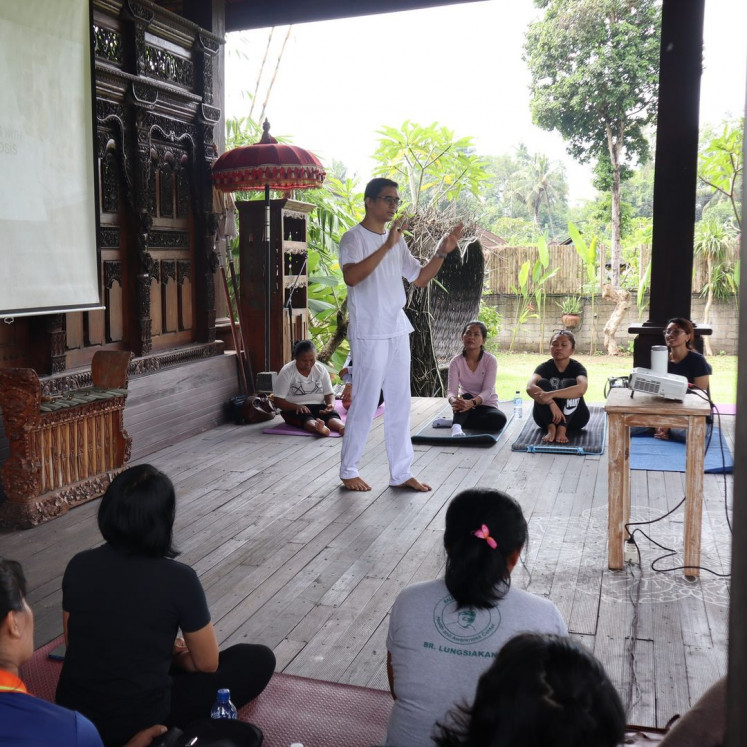Popular Reads
Top Results
Can't find what you're looking for?
View all search resultsPopular Reads
Top Results
Can't find what you're looking for?
View all search resultsShout it out loud: These Indonesians scream to heal trauma
Change text size
Gift Premium Articles
to Anyone
A growing number of Indonesian are finding relief in catharsis therapy
In October 2021, Wulan Amiruly experienced a panic attack due to her gastroesophageal reflux disease (GERD). Knowing something was wrong with her body, she looked for a solution to her problem by visiting a doctor and was administered GERD medication.
The 39-year-old needed to take at least 24 GERD medication pills daily to compensate for her inability to heal her illnesses. Yet, her sicknesses remained uncured.
As a result, she decided to join a catharsis class conducted by a Bali-based doctor, Gusti Putu Darmika, also known as Darmika, in Bali, to improve her health and well-being.
Initially, Wulan was not fully aware she once experienced such problematic developmental years of her life, until she decided to enroll in the screaming catharsis session.
"After the session of being able to let out my emotions, I realized my inner child is hurt, and that it affects my mentality and health," Wulan says.
Wulan claims after starting the therapy, neither her GERD nor panic attacks returned. Meanwhile, regarding her horrific background, she refuses to divulge additional information about her "traumatic" upbringing.
Shedding tears
According to Darmika, catharsis is a therapeutic practice that facilitates the expression of deep emotions in a nonjudgmental and accepting environment.
He further says releasing emotional expression and processing it had been demonstrated to reduce the prevalence of depressive and anxious thought patterns while increasing the possibility of a more constructive and hopeful worldview.
In general, catharsis is acknowledged as a technique that promotes emotional release through mechanisms such as screaming, crying or engaging in rage room activities.
Some may consider the screaming mechanism to be an emotional release. Darmika initially thought such a mechanism was related to mysticism. Thus, he initially avoided counseling because he regarded himself as an adamant thinker.
"After teaching and participating in various catharsis sessions that used screaming as a strategy, I discovered that it [screaming] impacts everyone uniquely," he says.
There is a science that explains why venting can help people release their frustration.
According to an article published by Harvard University, it is reported that crying effectively flushes stress hormones and other harmful chemicals from the body. When someone is crying, their body releases endorphins and the feel-good chemical oxytocin. Thus, individuals can relieve mental and physical suffering by crying or releasing emotions.
The 40-year-old doctor claims people experience greater happiness when they are authentic and make "no mask" efforts to appear otherwise in social situations.
Yet, Darmika later emphasized many people hid their emotions to please others or conceal their true feelings.
"Heed the warning of the wise: repressing the emotions won't do you any good and can even lead to depression," says Darmika, who has been handling catharsis for the past decade.
He says although tears can express happiness and grief, many people only equate tears with sadness. However, other people worry about being criticized for having a dramatic response, so they end up bottling their feelings.
We should not, however, treat the matter of mental health lightly. The Health Ministry reported over 19 million people in Indonesia (over the age of 15) have suffered from emotional and mental health concerns. Moreover, at least 12 million people (older than 15) suffered from depression in 2018, according to Basic Health Research (Riskesdas) research.
Therefore, there is an urgency in calling off the stigma around the mental health issue in the country.
Depression is considered a severe medical emergency because it can lead to suicidal ideation and conduct if left untreated, without professional help.
However, there may be other warning signals someone is unhappy or has developed a mental health problem. One of the alleged causes is a person's inability to concentrate, even complying with the most basic task, such as their job, regardless of the severity of the underlying problem.
Let it out: Expressing bad feelings could relieve stress, and it was possible doing so could lead to a happier life, according to Dr. Darmika, a doctor residing in Bali. (Courtesy of Dr. Darmika) (Archive/Courtesy of Dokter Darmika)"The cause of your unhappiness, even the conflict with your coworkers, is probably from within yourself; the trigger may be you are disappointed within yourself," Darmika adds.
Hence, Darmika suggests catharsis for people who want to express their suppressed feelings. He further explains experts regularly accompany people who undergo catharsis; if necessary, they must be supervised by a psychologist.
"Even though catharsis regulates the process of letting go of the repressed [negative] feelings, it is not adequate on its own because once the feelings have been expressed, what else must be done for the person to feel better?" he says.
Jakarta-based clinical psychologist Yunike Balsa Rhapsodia explains expressing emotions with a companion is advisable because screaming or venting is part of an overall therapeutic approach and cannot be done alone. She further advises individuals not to self-diagnose, adding anyone needing medical attention should seek it out from trained professionals.
She further noted it was advisable for trauma victims to frequently seek a psychologist's advice after navigating the origin of their issue.
"Because, once again, it depends on the case-by-case basis, as there are some instances where individuals, who eventually remember traumatic events, are not in a good state," Yunike says.
"Accepting the events that have occurred, however, may occasionally assist some individuals in letting go of their repressed feelings to engage more with the therapeutic process for better mental health treatment. Nevertheless, some people may experience subsequent trauma due to remembering it,” she continues.
The 32-year-old continues by pointing out emotions were energy that could not be destroyed but could be directed; thus, trauma was retained in the body. This situation emerges because sometimes unexpected events happen.
Moreover, she adds if the trauma was not communicated, catharsis could play a role through a screaming mechanism to release suppressed feelings.
Yunike later gives an analogy to illustrate how trauma may be observed in an accident that almost happens. Trauma, however, can occur indirectly. As an illustration, the outcome may be adverse when emotional needs are not addressed.
"Over time, a person may lose themselves, their voice, identity and emotions if their traumas are not addressed. The social influence may cause insecurity in social settings," Yunike adds.
Healing the inner child
Tingga Sari, a 28-year-old senior high school teacher in Jakarta, reveals she joined catharsis to overcome the sexual abuse she experienced as a child at the hands of a neighbor.
Tingga has always felt guilty because she grew up in a culture where a solid religious foundation was valued. Understandably, Tingga is going through an emotional crisis, as abuse victims often do. Her religiously devout family has added stress to her life, which has led her to feel overwhelming shame on numerous occasions.
She remarks, "I haven't been able to tell anyone about the compromising events in my life for years."
Tingga's life has not ever been easy; aside from her abusive childhood experience, being the oldest of three siblings, she prioritizes her siblings' needs before her own, making it unbearably challenging to understand herself as a person.
As a result of keeping others as her priority ahead of her own self, she admits she previously could not express herself for at least eight years.
"Upon joining the session [catharsis], I can release my burden in life, and in the last couple of years, I've been able to put myself first before everybody else; not in a selfish way, but more about appreciating myself a bit," Tingga says.
Tingga's therapy has helped her make peace with her painful past experiences and gain more self-awareness. She has found her husband, who accepts her for who she is and is willing to carry her past together.
"I can recall vividly when Darmika told me, ‘You're not wrong, and it's not your fault’, and eventually I could recollect my thoughts such that I could get through this [the trauma]," Tingga shares.
Tingga is not alone. Santi Johar, a resident of Jakarta who currently works in the private sector for an insurance company, says she had occasionally had suicidal thoughts due to her inability to express her emotions after experiencing "life turbulence", which she chose not to share during the interview.
To avoid negative thoughts, Santi tried to engage in several activities, including her favorite pastimes, such as mountain climbing.
"I need to have an activity that makes me want to have a purpose. Even if it's just a temporary relief, I'll do it," Santi says.
Santi tells The Jakarta Post there were times when she was just too desperate and she attempted to commit suicide three times due to her depression, inability to understand herself and inability to find the meaning of her life, during an interview on April 18.
"It seems even death won't accept me," she says. However, she is gratefully aware that what she did was ineffective; therefore, she looks for expert aid for additional support in dealing with her depression.
But it was not an easy journey; Santi feels isolated because many people draw the link between one's mental health and religious beliefs. She recalls when others said her lack of religion or adequate prayer time was the root of her mental health issues.
"I want to get across the idea that people's mental health and their religious or philosophical convictions are not related," Santi says, sharing her frustration from the judgment she endures from society.
"Once more thing to note: people must be conscious in selecting therapy, because studies on mental health exists, and people such as psychologists, psychiatrists and psychotherapists are devoting their expertise to it," Yunike concludes.












